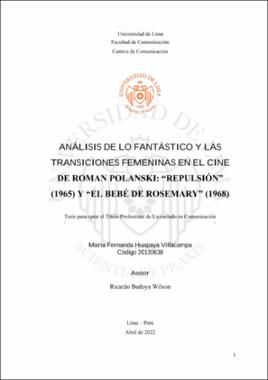| dc.contributor.advisor | Bedoya Wilson, Ricardo Humberto | |
| dc.contributor.author | Huapaya Villacampa, Maria Fernanda | |
| dc.date.accessioned | 2022-09-01T14:40:14Z | |
| dc.date.available | 2022-09-01T14:40:14Z | |
| dc.date.issued | 2022 | |
| dc.identifier.citation | Huapaya Villacampa, M.F. (2022). Análisis de lo fantástico y las transiciones femeninas en el cine de Roman Polanski: "Repulsión" (1965) y "El bebé de Rosemary" (1968) [Tesis para optar el Título Profesional de Licenciado en Comunicación, Universidad de Lima]. Repositorio Institucional de la Universidad de Lima. https://hdl.handle.net/20.500.12724/16466 | es_PE |
| dc.identifier.uri | https://hdl.handle.net/20.500.12724/16466 | |
| dc.description.abstract | The present work focuses on the study between the "fantastic" and the transits of the
feminine imaginary in the cinema of the director Roman Polanski, taking as objects of
analysis the films Repulsion (1965), and Rosemary's Baby (1968). In both, the
development of fantastic fiction highlights the experiences of the protagonists'
hallucination while they are in a liminal situation. One of them, the experience of isolation
and erotic repression in a London apartment. The other, the process of maternal gestation
in an environment that fills her with concerns. They, in their liminal transit, face visions
or hallucinations that could be explained as products of a mental disorder or as
manifestations of something supernatural, which roots both films in the concept of the
"fantastic" proposed by theorist Tzvetan Todorov | en_EN |
| dc.description.abstract | El presente trabajo se centra en el estudio entre lo “fantástico” y los tránsitos del
imaginario femenino en el cine del realizador Roman Polanski, tomando como objetos
de análisis las películas Repulsión (1965), y El bebé de Rosemary (1968). En ambas, el
desarrollo de la ficción fantástica pone de relieve las experiencias de la alucinación de
las protagonistas mientras se hallan en una situación liminal. Una de ellas, la vivencia del
aislamiento y la represión erótica en un departamento londinense. La otra, el proceso de
la gestación materna en un entorno que la colma de inquietudes. Ellas, en su tránsito
liminal, se enfrentan a visiones o alucinaciones que podrían explicarse como productos
de un disturbio mental o como manifestaciones de algo sobrenatural, lo que arraiga a
ambas películas en el campo de lo “fantástico” propuesto por el teórico Tzvetan Todorov. | es_PE |
| dc.format | application/pdf | |
| dc.language.iso | spa | |
| dc.publisher | Universidad de Lima | |
| dc.rights | info:eu-repo/semantics/openAccess | * |
| dc.rights.uri | https://creativecommons.org/licenses/by-nc-sa/4.0/ | * |
| dc.source | Repositorio Institucional - Ulima | es_PE |
| dc.source | Universidad de Lima | es_PE |
| dc.subject | Peliculas cinematográficas | es_PE |
| dc.subject | Mujeres | es_PE |
| dc.subject | Cine fantástico | es_PE |
| dc.subject | Motion pictures | en_EN |
| dc.subject | Women | en_EN |
| dc.subject | Fantasy films | en_EN |
| dc.title | Análisis de lo fantástico y las transiciones femeninas en el cine de Roman Polanski: "Repulsión" (1965) y "El bebé de Rosemary" (1968) | es_PE |
| dc.type | info:eu-repo/semantics/bachelorThesis | |
| thesis.degree.level | Título Profesional | es_PE |
| thesis.degree.discipline | Comunicación | es_PE |
| thesis.degree.grantor | Universidad de Lima. Facultad de Comunicación. | es_PE |
| dc.publisher.country | PE | |
| dc.type.other | Tesis | |
| thesis.degree.name | Licenciado en Comunicación | es_PE |
| renati.advisor.orcid | https://orcid.org/0000-0003-2780-6648 | |
| renati.discipline | 322026 | |
| renati.author.dni | 77575427 | |
| renati.level | https://purl.org/pe-repo/renati/level#tituloProfesional | * |
| renati.advisor.dni | 07786983 | |
| renati.juror | Cabrejo Cobian, José Carlos | |
| renati.juror | Loli Chau, Cesar | |
| renati.juror | Bedoya Wilson, Ricardo Humberto | |
| renati.type | https://purl.org/pe-repo/renati/type#tesis | * |
| dc.subject.ocde | https://purl.org/pe-repo/ocde/ford#5.08.00 | |
| ulima.cat | OI | |



